
don’t judge
What we see, or think we see may not be the actual picture…the map is not the territory. What I am sharing here is our perceptions of the world, our experiences and our interpretation of it all.
It is easy to judge. We judge when we see a deviation from what we know or expect. However, be open to deviations and difference. Find out more about these deviations and differences before passing the ‘death sentence’ on someone’s behaviors or performance. For example, when we see a colleague acting in a rude manner to a another colleague, don’t judge him (her). If it matters to you a lot, research that encounter by talking to the colleague who acted and the other who received the action privately. You’ll then know the truth and it shall set you free from judging them. What you can do next is maybe, if you so wish, to help them solve their differences.
It is very pertinent for us to remember, that we constantly filter all information (data) received through our five senses of sight, sound, feeling, taste and smell as each of these is received. Then, we generally interpreted each piece of the sensory information (data) in accordance to our own filters (existing thought, experience, values and beliefs, skill etc and analysis structure in the brain and mind) to make a summary of its meaning as a whole. The next set of filter occurs as we translate our understanding to words. And our translation is affected or determined by our range of words in our vocabulary to accurately explain it.
So, the point is, we filter lots of information of what we see, hear, feel, taste and smell. Lots of accurate information are lost during this filtering. Hence, what we perceived may not be accurate. The next best thing to do is to research and ask questions to recover, challenges and specify the ‘sensory facts’ that we received.
Therefore, I suggest that we stop judging and start recovering, challenging and specifying all of our sensory facts before we leap!














